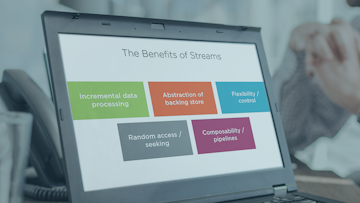
At the core of C# file IO is a thorough knowledge of how to manipulate files and directories and use streams. In this course, Working with Files and Streams in C#, you will learn the skills you need to read and write text, binary, and CSV files, and work with streams of data. First, you will learn how to manipulate files and directories on disk. Next, you will discover how to respond to changes in the file system and read and write data by loading entire files into memory or by incrementally processing them with streams. Finally, you will explore how to write testable file IO code and how to use a mock file system to create faster...
Read more
Good to know
Save this course
Activities
Career center
Computer and Information Systems Manager
Computer Programmer
Computer Systems Analyst
Database Administrator
Information Security Analyst
Software Engineer
Network Administrator
Software Developer
Systems Analyst
Web Developer
Technical Support Specialist
Machine Learning Engineer
Data Analyst
Data Scientist
Research Scientist
Reading list
Share
Similar courses
OpenCourser helps millions of learners each year. People visit us to learn workspace skills, ace their exams, and nurture their curiosity.
Our extensive catalog contains over 50,000 courses and twice as many books. Browse by search, by topic, or even by career interests. We'll match you to the right resources quickly.
Find this site helpful? Tell a friend about us.
We're supported by our community of learners. When you purchase or subscribe to courses and programs or purchase books, we may earn a commission from our partners.
Your purchases help us maintain our catalog and keep our servers humming without ads.
Thank you for supporting OpenCourser.


